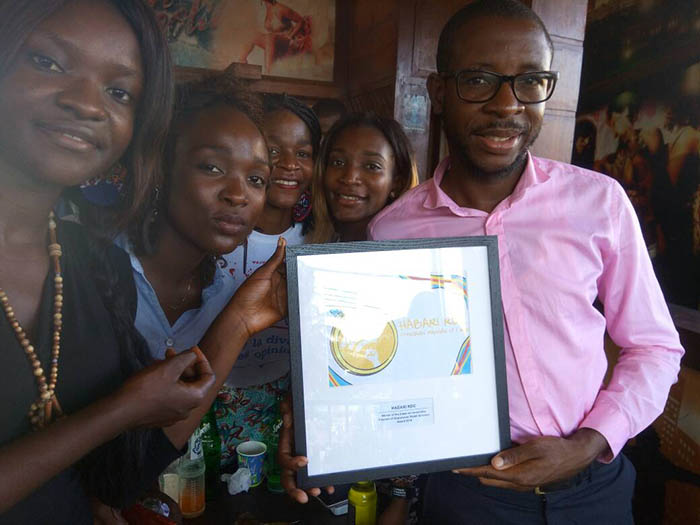[vc_row][vc_column][vc_column_text]
Since winning the Index on Censorship Freedom of Expression Award Fellowship for Digital Activism, Habari RDC, a collective of Congolese bloggers and web activists giving voice to the opinions of the country’s young people, has celebrated its second birthday.
Reflecting on its successes since July 2016 and the challenges still to come, Guy Muyembe, president of Habari, tells Index on Censorship: “It’s worth noting that Habari RDC started out as just an informal collective of Congolese bloggers, with no recognised structures or official documents. Being recognised by the Congolese state as a legally established organisation has been a great success.”
As well as the Index on Censorship award, Habari RDC was one of three beneficiaries of the Francophone Awards for Innovation in the Media and was selected for the Dutch NGO RNW Media’s Citizen’s Voice programme. “This programme provides us with an annual endowment that covers our running costs, but also with consistent editorial support, which enables Habari RDC to produce quality blog posts,” Muyembe says.
Habari’s website now ranks among the biggest online news outlets in the country and its Facebook page is one of the most popular among Congolese users.
As the organisation grows, it is becoming more ambitious and most now focus on further training for its staff. “We feel a great need to step up our expertise,” Muyembe says. “We are particularly interested in learning how to evaluate the impact of our activities, but also in social media training.”
In July, Habari received training from the University of Essex’s Tim Fenton on reporting on elections. “The training was very useful and came at the right time, as the election period approaches. It will help us to perfect a proper work plan for the election coverage.”
A presidential election is due to take place in the Democratic Republic of the Congo on 23 December 2018, more than two years behind schedule. Muyembe’s greatest hope for the election is peace. “Like many of my compatriots, I’m tired of war,” he says. “Free and democratic elections would certainly cement the legitimacy of the leaders and put an end to this cycle of war.”
On June 10 2018, Luc Nkulula, a democracy activist and a leader in the peaceful movement against president Joseph Kabila’s rule, died in a suspicious fire at his home in the eastern city of Goma. Nkulula was an active member of the citizens’ movement Struggle for Change.
“Luc Nkulula’s death is a great shock and a great challenge for all Congolese activists. To be honest, it has shown how dangerous being an engaged citizen can be. Far from discouraging the activists, though, this has galvanised them,” Muyembe says.
Muyembe tells Index that violations against the media are widespread and have lead to an overall decrease in the quality of journalism, which is especially problematic in the run-up to an election.
“Journalists are forced to self-censor or even to compromise their principles in order to keep working, but our experience with Habari RDC has shown that treating information fairly is one of the main ways for media organisations to protect themselves against certain predators of the press,” he says. “It is in the interests of media organisations in the Congo not to side with political groups or constituencies. As it happens, online organisations have more freedom than other media — television, radio, newspapers — and they must make the most of that.”
Muyembe says online media is freer as the government is “not yet capable of controlling the internet”. However, as political tensions in the country have escalated, more threats to online freedoms are emerging. “There is a risk of another complete internet shutdown if the political crisis reaches fever pitch, but it is fair to say that Congolese netizens enjoy great freedom when compared to neighbouring countries in Central Africa,” Muyembe says.
Ahead of the election, Habari will be focusing on social cohesion and inclusive government. The country has been in crisis since independence in 1960. “Most of the leaders who have governed the country since then have encountered issues of legitimacy,” Muyembe says. “In that same time, the people — especially the young — have faced great poverty: more than half the population lives on less than $1 per day, according to the World Bank’s statistics.”
Because of these problems, Muyembe says huge hopes hinge on December’s election.
“We will train our bloggers so that they will be better equipped to confront issues, but also to enter into a dialogue with the decision-makers so that their programmes can give more consideration to young people’s concerns,” Muyembe says. “This is where this year’s elections become so important to us: they will enable us to try to get the decision-makers to take young people’s issues into account.”[/vc_column_text][vc_row_inner][vc_column_inner width=”1/4″][vc_column_text]
Awards Fellowship
[/vc_column_text][/vc_column_inner][vc_column_inner width=”3/4″][vc_column_text]
Index works with the winners of the Freedom of Expression Awards Fellowship to help them achieve goals through a 12-month programme of capacity building, coaching and strategic support.
Through the fellowships, Index seeks to maximise the impact and sustainability of voices at the forefront of pushing back censorship worldwide.
Learn more about the Freedom of Expression Awards Fellowship.[/vc_column_text][/vc_column_inner][/vc_row_inner][/vc_column][/vc_row][vc_row][vc_column][vc_basic_grid post_type=”post” max_items=”4″ element_width=”6″ grid_id=”vc_gid:1534944945145-5b5e9c82-86f0-8″ taxonomies=”24389″][/vc_column][/vc_row]




